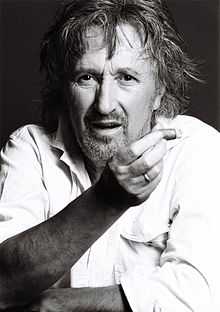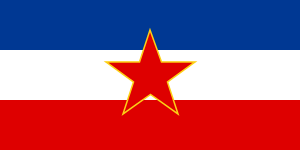Juraj Jakubisko

Juraj Jakubisko (born 30 April 1938, Kojšov, Czechoslovakia current Slovakia) is a Slovak film director. In his movies he managed to catch life's most beautiful colors, unhinge the poetry behind the ordinary and to be ahead of his time without forgetting his roots. “In Jakubisko films the irrational, mysterious and sensational seems to be as natural as the life itself, although not all of us are able to have Jakubisko ́s eye, enabled to see that mysterious, unexpected and fantastic even in simple ordinary daily life“ - Federico Fellini. Thanks to his typical handwriting, full of allegory, fantasy and visionary imagination, about Jakubisko is written as about an artist, who with his magical realism in this part of the world means in the film the same, what Gabriel García Márquez in the literature of the Latin America. Juraj Jakubisko attracts the international attention thanks to his experimental films.
He is currently based in Prague.[1]
Career
Before entering the film industry, Jakubisko taught still photography at a Bratislava secondary school for applied arts and worked for a television in Košice. In 1960 he moved to Prague where he attended the FAMU (Film and TV School of the Academy of Performing Arts),[2] studying direction under Václav Wasserman's tuition. He graduated in 1965. After his studies Jakubisko worked with Alfréd Radok at the Laterna magika[3] theater in Prague and began winning international acclaim with his experimental short films before making his first feature Crucial Years or Christ's Years (Kristove roky, 1967).
The promising career of the young director was heavily crippled by the communist regime. He managed to complete only 3 films before he was sidetracked in the difficult period following the Soviet-led Warsaw Pact invasion which crushed the Prague Spring reform period in Czechoslovakia. During that period, he made a few documentaries. Fortunately the situation got gradually better so that he could film Three Sacks of Cement and a Live Rooster (Tri vrecia cementu a živý kohút, 1976) although it was not released until 1978.
He returned to feature film-making with Build a House, Plant a Tree (Postav dom, zasaď strom, 1980). Jakubisko earned international acclaim with the epic A Thousand-Year Old Bee (sometimes mistranslated as "millennial"; Tisícročná včela, 1983). This movie was a real event for the country. People of all ages went to see it in mass and the tickets were sold out for many weeks after its release. Since then he won further international awards and earned great respect worldwide. Another popular film still played in TV is Perinbaba.
Jakubisko is often also credited as a screenplay writer as he usually co-writes or writes the scripts of his movies.
Bathory
A lot of gossip and curiosity has been generated regarding his project Bathory. The film stars Anna Friel as Elizabeth Báthory, a 16th-17th century Hungarian countess, who some argue was one of history's most prolific mass murderers. She was reputed for example to have bathed in the blood of young Slovak women. Famke Janssen was originally cast in the title role.
In addition to being Jakubisko's first English-language film, Bathory was reported as the most expensive motion picture production in the history of Czech or Slovak cinema, involving investments of numerous companies around Europe.
In 2007 it was reported that two former production staff members, Jan Milic and Karel Lupomesky, stole a copy of Bathory from studios in Prague and were threatening to release it on the Internet if they weren't given GB £12,000. They were soon apprehended and the film was recovered, apparently without being prematurely leaked online. After their trial, the pair were given eight and ten month suspended sentences for trying to blackmail producer Deana Jakubisková-Horváthová.
Bathory world premiere was held at the Karlovy Vary Film Festival, Czech Republic on July 10, 2008. The film was declared as the most successful film of the decade in the Czech Republic and the most successful film of all time in the Slovak Republic. As well won numerous awards around the world e.g.: World Fest Houston - (2011) / The best historical film - Special Jury Prize REMI and the best artistic achievement - Gold Award REMI, at Monaco Film Festival - (2010) - The Best Artistic Achievement, the Price of Slovak Film Academy - SUN IN THE NET (2010), the best art direction, costumes, the best actress in the main role, the Price IGRIC - Slovakia - (2009) - for the artistic side of the film, CZECH LION - (2009) the most successful film, the best artistic achievement of the year, the best designer and concept art, the best costume designer.
In the Present
In 2013 Jakubisko published the first part of his autobiography book Zive stribro. Currently, the director is working on the preparation of the historical epic about the first Slavic empire Great Moravia, which was the first West Slavic state to emerge from "the most powerful tribal area in Central Europe", named the Forgotten Epic.
The film is scheduled for theatrical release in 2017.[4]
Filmography
for full filmography check imdb
- Bathory (2008)
- Post Coitum (2004)
- An ambiguous report about the end of the world (1997)
- It's Better to Be Wealthy and Healthy Than Poor and Ill (1992)
- Takmer ružový príbeh (1990), (Almost a Pink story) for TV 2000 Wiesbaden, Germany
- Dovidenia v pekle, priatelia (1970, released 1990) (See You in Hell, Friends)
- Sedím na konári a je mi dobre (1989) (I'm Sitting on a Branch and I'm Fine)[5]
- Frankensteinova teta (1987) TV miniseries (Frankenstein's Aunt)
- Pehatý Max a strašidlá (1987) (Freckled Max and the Spooks)
- Perinbaba (1985)
- Tisícročná včela (1983) (A Thousand-Year Old Bee)[6]
- Nevera po slovensky (1981) (Infidelity, Slovak Style; 2-part TV miniseries)
- Postav dom, zasaď strom (1980) (Build a House, Plant a Tree)
- Tri vrecia cementu a živý kohút (1978) (Three bags of cement and a live rooster), documentary
- Bubeník Červeného kríža (1977) (The Red Cross drummer), documentary
- Slovensko - krajina pod Tatrami (1975) (Slovakia - a country under the Tatras), TV documentary
- Stavba storočia (1972) (The Construction of the Century), documentary
- Vtáčkovia, siroty a blázni (1969) (Birds, Orphans and Fools)
- Zbehovia a pútnici (1968) (The Deserters and the Nomads, aka Deserters and Pilgrims)
- Kristove roky (1967) (Crucial Years aka Christ's Years)
- Čekají na Godota (1965)
- Déšť (1965) (Rain)
- Mlčení (1963) (Silence)
- První třída (1962) (First Class)
- Strieborný vietor (1961) (Silver Wind)
- Každý den má své jméno (1960) (Every day has a name)
- Poslední nálet (1960) (Last attack)
Personal awards
Juraj Jakubisko was awarded at more than 80 international film festivals.
2012
-
 Gijón International Film Festival
Gijón International Film Festival
• Personal award for outstanding achievements in cinematography and lifetime artistic contributions to world Cinema
2010
-
 Monaco Charity Film Fest
Monaco Charity Film Fest
Bathory
• The Best Artistic achievement -
 Slnko v sieti
Slnko v sieti
Bathory
• Best artistic design
2009
-
 Czech Lion Awards 2008
Czech Lion Awards 2008
Bathory
• The best artistic asset of the year
• The best artist and artistic concept -
 Igric Award
Igric Award
Bathory
• Award for the Artistic Design of the Film -
 Associazione Culturale Premio Elsa Morante
Associazione Culturale Premio Elsa Morante
• Premia Elsa Morante, Cinematography award
2008
-
 XLIII. Karlovy Vary International Film Festival
XLIII. Karlovy Vary International Film Festival
• Special Crystal Globe for outstanding achievements in cinematography and lifetime artistic contributions to world Cinema
2003
-
 Czech Lion Awards 2002
Czech Lion Awards 2002
• Personal award for outstanding achievements in cinematography and lifetime artistic contributions to Czech Cinema -
 The Main Government Award
The Main Government Award
• Pribina Cross, Second Class
2002
-
 X. IFF Art Film Trenčianské Teplice
X. IFF Art Film Trenčianské Teplice
• Golden Camera award for outstanding achievements in cinematography and lifetime artistic contributions to Slovak Cinema
2001
-
 The Masaryk Academy Of The Arts
The Masaryk Academy Of The Arts
• Lifetime Achievement Award -
 Czech Lion Awards 2000
Czech Lion Awards 2000
Wildflowers
• The best film poster
2000
-
 Film Parade of Juraj Jakubisko in Beograd
Film Parade of Juraj Jakubisko in Beograd
• Zlatni Pečat Jugoslovenske Kinoteke (Golden Seal) for Major Contribution To The Advancement Of Art In Film (awarded by The Yugoslavian Cinematheque)
1999
-
 Cran Gavier´99
Cran Gavier´99
Pretty sitting on the branch
• Prize for the best film
1998
-
 Taos Talking Pictures Film Festival
Taos Talking Pictures Film Festival
• Maverick award For Vision in Film -
 Taos Talking Pictures Film Festival
Taos Talking Pictures Film Festival
An ambiguous report about the end of the world
• Prize for visual contribution in cinematography -
 XXI. Denver international film festival
XXI. Denver international film festival
• Outstanding achievement In the Art of Film -
 Montreal World Film Festival
Montreal World Film Festival
An ambiguous report about the end of the world
• Prize for the Greatest Artistic Contribution and Cinematography of the year -
 Czech Literary Fund
Czech Literary Fund
• The best director of the year -
 San Diego Film Festival
San Diego Film Festival
An ambiguous report about the end of the world
• Price for the greatest direction -
 Slovak Literary fund
Slovak Literary fund
An ambiguous report about the end of the world
• Special prize for direction
1997
-
 Pescara
Pescara
An ambiguous report about the end of the world
• Prize for Best Director, Golden Dolphin
1993
-
 IX. Festival de Cinema de Troia Setubal, Costa Azil
IX. Festival de Cinema de Troia Setubal, Costa Azil
It's Better to Be Wealthy and Healthy Than Poor and Ill
• Grand prize Golden Dolphin
1991
-
 Los Angeles Film Festival - AFI Fest
Los Angeles Film Festival - AFI Fest
• Tribute award
1990
-
 Moscow International Film Festival 1990
Moscow International Film Festival 1990
Pretty sitting on the branch
• Grand Prize -
 Festival of Czechoslovak film
Festival of Czechoslovak film
Pretty sitting on the branch
• Special Jury Prize -
 IFF Stasbourg
IFF Stasbourg
Pretty sitting on the branch
•Le Prix du Jury and the Alsace Media de Strasbourg Prize -
 Festival československého filmu
Festival československého filmu
Pretty sitting on the branch
• Special Jury Award
1989
-
 Venice Film Festival
Venice Film Festival
Pretty sitting on the branch
• Certificate of Merit RAI II
1987
-
 International Film Festival Rimouski
International Film Festival Rimouski
Perinbaba
• Grand Prize Camerio -
 I. International Film Festival for children Buenos Aires
I. International Film Festival for children Buenos Aires
Perinbaba
• Grand Prize
1986
-
 Zlín Film Festival
Zlín Film Festival
Perinbaba
• Special Jury Prize -
 Perinbaba
Perinbaba
•Slovakian Film Medal -
 XXIV. Festival of Czech and Slovakian Film
XXIV. Festival of Czech and Slovakian Film
Perinbaba
• Prize for art production -
 IV. Film Festival for yought Lyon
IV. Film Festival for yought Lyon
Perinbaba
• Young Audience Member’s Prize for best film - UNICEF Grand Prix
-
 Film Festival in Belgrade
Film Festival in Belgrade
Perinbaba
• Audience Prize for best film -
 XLII.Venice Film Festival
XLII.Venice Film Festival
Perinbaba
• Certificate of Merit RAI II -
 Gijón International Film Festival
Gijón International Film Festival
Perinbaba
• Jury Prize for the best special effects
1985
-
 XLI.Venice Film Festival
XLI.Venice Film Festival
Perinbaba
• Catholic Prize
1984
-
 XL. Venice Film Festival 1984
XL. Venice Film Festival 1984
• Golden Phoenix for The best art direction and cinematography -
 FEST Belgrade
FEST Belgrade
The Millennial Bee
• UNICEF Prize -
 IV. IFF Sevilla
IV. IFF Sevilla
The Millennial Bee
• Grand Prize -
 The Millennial Bee
The Millennial Bee
Czechoslovak Journalists’ Prize -
 XXII. Film Festival Banská Bystrica
XXII. Film Festival Banská Bystrica
The Millennial Bee
• Grand Prize
Theatre
- Casanova (1995) ballet, Laterna Magica, Prague, Czech Republic
- Krútňava (1999) opera, Slovak National Theatre, Bratislava, Slovakia
- Svätopluk (opera) (2008) opera, Slovak National Theatre, Bratislava, Slovakia
Exhibitions
- Paris (2000), France
- Berlin (2004),Germany, Italy (2004)
- Prague (2004, 2005), Czech Republic
- Miro Gallery, Bratislava (2009), Slovakia
- Presidential palace, Bratislava (2009), Slovakia
- 6 exhibitions (2010), Czech Republic
References
- ↑ http://www.jakubiskofilm.com/en/
- ↑ http://web.amu.cz/?r_id=610
- ↑ http://www.laterna.cz/welcome.php?lang=en
- ↑ Ananova - Blackmailers convicted over sexy Friel film
- ↑ Andrew James Horton, "Juraj Jakubisko's Sedim na konari a je mi dobre."
- ↑ Kevin Brochet, "Juraj Jakubisko: A Thousand-Year Old Bee (Tisícročná včela) 1983."
External links
- Juraj Jakubisko at the Internet Movie Database
- Slovak Movie Database (Slovak)
- Bathory website (Czech)
- Bathory movie trailer on YouTube
- Director profile 2013 on YouTube
- Director profile - Juraj Jakubisko on YouTube
|